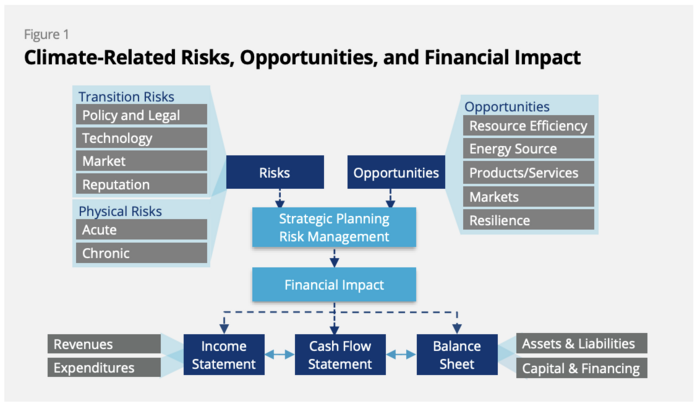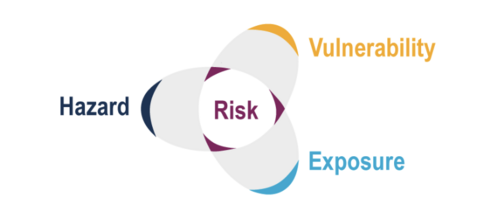Main Page: Difference between revisions
mNo edit summary |
No edit summary |
||
| Line 93: | Line 93: | ||
font-weight: bold; font-size: 21px">Climate-related Financial Risk | font-weight: bold; font-size: 21px">Climate-related Financial Risk | ||
=== What is climate risk? === | === What is climate risk? === | ||
'''Climate risk''' is the potential for negative consequences for human or ecological systems from the [[wikipedia:Impacts_of_Climate_Change|impacts of climate change]]<ref>IPCC, 2022: Annex II: Glossary [Möller, V., R. van Diemen, J.B.R. Matthews, C. Méndez, S. Semenov, J.S. Fuglestvedt, A. Reisinger (eds.)]. In: Climate Change 2022: Impacts, Adaptation and Vulnerability. Contribution of Working Group II to the Sixth Assessment Report of the Intergovernmental Panel on Climate Change [H.-O.Pörtner, D.C. Roberts, M. Tignor, E.S. Poloczanska, K. Mintenbeck, A. Alegría, M. Craig, S. Langsdorf, S. Löschke, V. Möller, A. Okem, B. Rama (eds.)]. Cambridge University Press, Cambridge, UK and New York, NY, USA, pp. 2897–2930, doi:10.1017/9781009325844.029.</ref>. | '''[[wikipedia:Climate_risk|Climate risk]]''' is the potential for negative consequences for human or ecological systems from the [[wikipedia:Impacts_of_Climate_Change|impacts of climate change]]<ref>IPCC, 2022: Annex II: Glossary [Möller, V., R. van Diemen, J.B.R. Matthews, C. Méndez, S. Semenov, J.S. Fuglestvedt, A. Reisinger (eds.)]. In: Climate Change 2022: Impacts, Adaptation and Vulnerability. Contribution of Working Group II to the Sixth Assessment Report of the Intergovernmental Panel on Climate Change [H.-O.Pörtner, D.C. Roberts, M. Tignor, E.S. Poloczanska, K. Mintenbeck, A. Alegría, M. Craig, S. Langsdorf, S. Löschke, V. Möller, A. Okem, B. Rama (eds.)]. Cambridge University Press, Cambridge, UK and New York, NY, USA, pp. 2897–2930, doi:10.1017/9781009325844.029.</ref>. | ||
[what is climate-related financial risk] Climate is also a risk for financial sector. | |||
study approaches | |||
data needed. | |||
<div class="mw-collapsible mw-collapsed" data-expandtext="Read more" data-collapsetext="Read less"> | <div class="mw-collapsible mw-collapsed" data-expandtext="Read more" data-collapsetext="Read less"> | ||
Common approaches to [[wikipedia:Risk_assessment|risk assessment]] and [[wikipedia:Risk_management|risk management]] strategies based on [[wikipedia:Natural_Hazards|natural hazards]] have been applied to climate change impacts although there are distinct differences. | |||
Common approaches to [[wikipedia:Risk_assessment|risk assessment]] and [[wikipedia:Risk_management|risk management]] strategies based on [[wikipedia:Natural_Hazards|natural hazards]] have been applied to climate change impacts although there are distinct differences. | |||
The [[wikipedia:Intergovernmental_Panel_on_Climate_Change|Intergovernmental Panel on Climate Change]] (IPCC) assessment framework is based on the understanding that climate risk emerges from the interaction of three risk factors: [[wikipedia:Hazard|hazards]], [[wikipedia:Climate_change_vulnerability|vulnerability]] and exposure. The IPCC summarizes published research on climate risk evaluations. <ref>About — IPCC". Retrieved 2023-11-16.</ref> International and research communities have been working on various approaches to [[wikipedia:Climate_risk_management|climate risk management]] including [[wikipedia:Climate_risk_insurance|climate risk insurance]]. | The [[wikipedia:Intergovernmental_Panel_on_Climate_Change|Intergovernmental Panel on Climate Change]] (IPCC) assessment framework is based on the understanding that climate risk emerges from the interaction of three risk factors: [[wikipedia:Hazard|hazards]], [[wikipedia:Climate_change_vulnerability|vulnerability]] and exposure. The IPCC summarizes published research on climate risk evaluations. <ref>About — IPCC". Retrieved 2023-11-16.</ref> International and research communities have been working on various approaches to [[wikipedia:Climate_risk_management|climate risk management]] including [[wikipedia:Climate_risk_insurance|climate risk insurance]]. | ||
Revision as of 23:50, 9 September 2024
Welcome to UW Climate Risk Lab Wiki,
the place for best climate risk data, analysis, and tools available for all.
UW Climate Risk Lab
The UW Climate Risk Lab (CRL) is a multidisciplinary research and innovation center based at the University of Washington Foster School of Business in the Department of Finance & Business Economics. Established in 2022, it advances data and technology solutions to issues in climate-related financial risk for corporate and government decision-makers. Phillip Bruner, co-founder of the CRL, currently serves as its Executive Director.
The CRL brings together academics and professionals in climate finance, risk management, business analytics, data engineering, computer science, atmospheric sciences, supply chains management, information systems and AI. It collaborates with several initiatives within the University of Washington (UW), which include the Buerk Center for Entrepreneurship, Clean Energy Institute, Creative Destruction Lab, eSciences Institute and Urban Infrastructure Lab. Its external partners include: the Duke Energy Data Analytics Lab, the Pacific Northwest Mission Accelerator Center, and Washington Maritime Blue.
History
The CRL originated in 2022 with a grant from the Office of UW President Ana Marie Cauce made to the Foster School of Business, Department of Finance & Business Economics. The idea was then developed by a team lead by Phillip Bruner, UW Professor of Sustainable Finance, Charlie Donovan, Senior Economic Advisor at Impax Asset Management, Sam Shugart, New Product & Services Market Analyst at Puget Sound Energy and Simon Park, Harvard graduate and Fellow of the UW Evans School of Public Policy.
Steering Committee
The CRL Steering Committee is currently made up of the following members:
- Phillip Bruner, Professor of Sustainable Finance and CRL Executive Director
- Léonard Boussioux, Assistant Professor of Information Systems and Operations Management
- Charlie Donovan, Senior Economic Advisor at Impax Asset Management and CRL Leadership Council Chair
- Emer Dooley, Artie Buerk Faculty Fellow and Site Lead at Creative Destruction Lab
- Dale Durran, Professor of Atmospheric Sciences and Adjunct Professor of Applied Mathematics
- Kristie Ebi, Professor of Global Health and Environmental and Occupational Health Sciences and Founder of the UW Center for Health and the Global Environment
- Sara Jones, Director of the Masters of Supply Chain Management and Master of Science in Business Analytics
- Dan Schwartz, Boeing-Sutter Professor of Chemical Engineering and Founding Director of the Clean Energy Institute
- Jan Whittington, Associate Professor of the Department of Urban Design and Planning and Founding Director of the Urban Infrastructure Lab
License Information
This website’s content is licensed under a Creative Commons Attribution 4.0 International License.
You are free to:
- Share — copy and redistribute the material in any medium or format for any purpose, even commercially.
- Adapt — remix, transform, and build upon the material for any purpose, even commercially.
- The licensor cannot revoke these freedoms as long as you follow the license terms.
Under the following terms:
- Attribution — You must give appropriate credit, provide a link to the license, and indicate if changes were made. You may do so in any reasonable manner, but not in any way that suggests the licensor endorses you or your use.
- No additional restrictions — You may not apply legal terms or technological measures that legally restrict others from doing anything the license permits.
Notices:
- You do not have to comply with the license for elements of the material in the public domain or where your use is permitted by an applicable exception or limitation.
- No warranties are given. The license may not give you all of the permissions necessary for your intended use. For example, other rights such as publicity, privacy, or moral rights may limit how you use the material.
Read the full license here.
What is climate risk?
Climate risk is the potential for negative consequences for human or ecological systems from the impacts of climate change[1].
[what is climate-related financial risk] Climate is also a risk for financial sector.
study approaches
data needed.
Common approaches to risk assessment and risk management strategies based on natural hazards have been applied to climate change impacts although there are distinct differences.
The Intergovernmental Panel on Climate Change (IPCC) assessment framework is based on the understanding that climate risk emerges from the interaction of three risk factors: hazards, vulnerability and exposure. The IPCC summarizes published research on climate risk evaluations. [2] International and research communities have been working on various approaches to climate risk management including climate risk insurance.
Climate change is a medium- to long-term trend that is expected to have significant financial impacts on companies in affected industries, including on their credit profiles and/or share prices. However, this knowledge is not particularly helpful for lenders, investors, or regulators unless these climate-related financial risks can be further defined in terms of their scope and, more importantly, their timing and likelihood. It is necessary to identify climate risks to industries before they cause reductions in asset utilization or valuation, reduced income and margins, or other financial impacts—changes that translate into credit risk and influence lenders’ decisions about financial profiles. [3]
There are two categories of climate-related financial risk, according to the Taskforce on Climate-Related Financial Disclosures (TCFD): [4]
- Transition Risks: Risks related to the transition to a lower-carbon economy. [Read more]
- Physical Risks: Risks related to the physical impacts of climate change. [Read more]

Source: Recommendations of the Task Force on Climate-related Financial Disclosures
Data
The risk of climate change impacts results from dynamic interactions among climate-related hazards, the exposure and vulnerability of affected human and ecological systems, and also responses (see section 1.2.1 of IPCC AR6 WG2[5]), as illustrated by Figure 2.
The data required for climate risk assessment is therefore organized into three key areas: climate hazard, exposure, and vulnerability, for the two types of climate risks below:

Source: IPCC AR6 WG2
References
- ↑ IPCC, 2022: Annex II: Glossary [Möller, V., R. van Diemen, J.B.R. Matthews, C. Méndez, S. Semenov, J.S. Fuglestvedt, A. Reisinger (eds.)]. In: Climate Change 2022: Impacts, Adaptation and Vulnerability. Contribution of Working Group II to the Sixth Assessment Report of the Intergovernmental Panel on Climate Change [H.-O.Pörtner, D.C. Roberts, M. Tignor, E.S. Poloczanska, K. Mintenbeck, A. Alegría, M. Craig, S. Langsdorf, S. Löschke, V. Möller, A. Okem, B. Rama (eds.)]. Cambridge University Press, Cambridge, UK and New York, NY, USA, pp. 2897–2930, doi:10.1017/9781009325844.029.
- ↑ About — IPCC". Retrieved 2023-11-16.
- ↑ Imperial College Business School Center for Climate Finance & Investment (February 2022). “What is Climate Risk? A Field Guide for Investors, Lenders, and Regulators.” Available at: https://imperialcollegelondon.app.box.com/s/te5eahz3x47q93vufwwu3ntmf5rxecxs
- ↑ Taskforce on Climate-Related Financial Disclosures (June 2017). “Recommendations of the Taskforce on Climate-related Financial Disclosures: Final Report.” Available at: https://assets.bbhub.io/company/sites/60/2021/10/FINAL-2017-TCFD-Report.pdf
- ↑ Figure 1.5 in Ara Begum, R., R. Lempert, E. Ali, T.A. Benjaminsen, T. Bernauer, W. Cramer, X. Cui, K. Mach, G. Nagy, N.C. Stenseth, R. Sukumar, and P. Wester, 2022: Point of Departure and Key Concepts. In: Climate Change 2022: Impacts, Adaptation, and Vulnerability. Contribution of Working Group II to the Sixth Assessment Report of the Intergovernmental Panel on Climate Change [H.-O. Pörtner, D.C. Roberts, M. Tignor, E.S. Poloczanska, K. Mintenbeck, A. Alegría, M. Craig, S. Langsdorf, S. Löschke, V. Möller, A. Okem, B. Rama (eds.)]. Cambridge University Press, Cambridge, UK and New York, NY, USA, pp. 121-196, doi:10.1017/9781009325844.003.